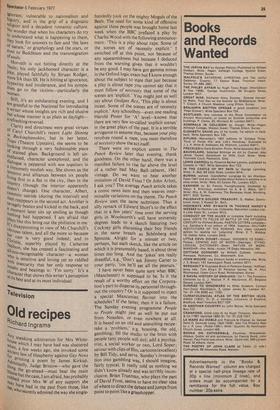T e l e v is i on
Old recipes
chard Ingrams
LA rlY sneaking admiration for Mrs Whiteuse which I may have had was shattered a few weeks ago, she invoked some 'relent law of blasphemy against Gay News Printing a poem by James Kirkup. thciirnittedlY, Judge Bristow—who gave the blng the go-ahead—must bear the main r ai.nle but the case, I am afraid, has probably rn°,ubed poor Mrs W of any support she „,'Y have had in the past from those, like '"e, who secretly admired the way she single handedly took on the mighty Moguls of the Beeb. The need for some kind of offensive against these people was brought home last week when the BBC prefaced a play by Charles Wood with the following announcement: 'This is a play about rape. Some of the scenes are of necessity explicit.' I switched off at this point, not because of any squeamishness but because I deduced from the warning given that it wouldn't be any good. I may have got gamma minus in the Oxford logic exam but I know enough about the subject to state that just because a play is about rape you cannot say that it must follow of necessity that some of the scenes are 'explicit.' You might just as well say about Oedipus Rex, 'This play is about incest. Some of the scenes are of necessity explicit.' Any schoolboy—even one reading Harold Pinter for 'A' level—knows that there are very few so-called 'explicit scenes' in the great plays of the past. It is a terrible arrogance to assume that, because your play revolves round a rape, you must therefore of necessity show the act itself.
There were no explicit scenes in The Punch Review later that evening, thank goodness. On the other hand, there was a manifest failure to rise far above the level of a rather bad May Ball cabaret, 1961 vintage. Do we want to hear another imitation of David Frost ? Or John Arlott, I ask you? The average Punch article takes a comic news item and then weaves interminable variations on the theme. The Punch Review uses the same technique. Thus a silly remark of Edward Short's to the effect that in a few years' time even the serving girls in Woolworth's will have university degrees leads to a sketch featuring two Cockney girls discussing their boy friends in the same breath as Schonberg and Spinoza. Alright for a minute or two, perhaps, but each sketch, like the article on which it is presumably based, is about three times too 'long. And the 'jokes' are really dreadful, e.g. Don't ask Jimmy Carter to your party, 'cos he'll eat all the peanuts.'
I have never been quite sure what BBC (Manchester) is supposed to be. Is it the result of a worthy effort on the Corporation's part to disperse its personnel throughout the country? Or is it supposed to inject a special Mancunian flavour into the schedules? lithe latter, then it is a failure.
The Sunday evening programme People to People might just as well be put out from Neasden, or even nowhere at all.
It is based on an old and unexciting recipe: take a 'problem,' e.g. housing, the old, gambling; fill the studio to the brim with
people (any people will do); add a psychiatrist, a social worker or two, Lord Soper; savour with clips of film, cartoons (excellent) by Bill Tidy, and serve. Sunday's investigation into gambling was, I should imagine, fairly typical. It really told us nothing we didn't know already and was terribly inconclusive. Brian Trueman, who plays the part
of David Frost, seems to have no clear idea of where to direct the debate and jumps from point to point like a grasshopper.


































 Previous page
Previous page